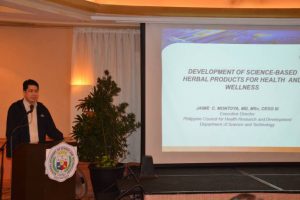NEWS AND UPDATES
DOST examines challenges, solutions on science-based herbal industry

On February 15, 2012, Dr. Jaime C. Montoya, Executive Director of the Philippine Council for Health Research and Development of the Department of Science and Technology (PCHRD-DOST) led the roundtable discussion entitled “Strengthening the Science-Based Herbal Industry in the Philippines: Issues, Challenges and Solutions†at the Traders Hotel in Manila, organized by the National Academy of Science and Technology (NAST).
The discussion focused on the challenges involved in the development of science-based herbal products for health and wellness in the Philippines. Action plans to resolve issues were also highlighted in the presentations.
Dr. Montoya presented PCHRD’s drug discovery and development program which includes the utilization of natural substances from terrestrial and marine sources that can be developed up to the pre-clinical stage for common infectious diseases and lifestyle related disorders.
According to Dr. Montoya, the drug discovery process takes time and requires huge amount of research funding.
“Out of 10,000 compounds screened, only five compounds reach clinical testing and only one compound makes it as a drug. This process takes up an average duration of 12 to 15 years and costs $1.2 to $1.6 billion,†Dr. Montoya said.
Though this is the case, he pointed out that confidence in the use of natural products cannot be underestimated. “The analysis of drug origins from 1981-2002 showed that 28% of new chemical entities (NCE) launched in the market were natural products and 24% were synthetic or natural mimic compounds. The combined 52% of new chemical entities suggests that natural products are important sources of new drugs or lead compounds suitable for further modifications during drug development,†he explained.
Dr. Montoya proposed the following options to consider in improving the program: 1) development or outsourcing of expertise; 2) identification of other options for conducting other pre-clinical assays, 3)consideration of medium throughput versus high throughput screening; 4) establishment of centralized facilities; and 5) conduct of pre-clinical screening only.




